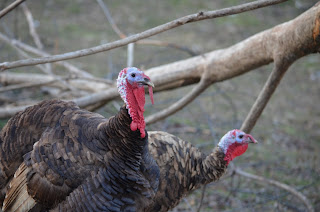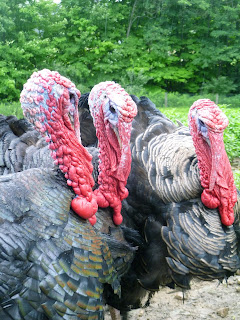Always in November
Just before December
Comes Thanksgiving Day with turkey . . .
. . . and Thanksgiving Day is just around the corner! This year consider branching out from super market turkey by looking up local farmers who raise heritage turkeys. The vast majority of turkeys raised in the United States are a breed called Broad Breasted Whites. They achieve gargantuan size and if left to live much past slaughter day will develop mobility problems due to their over-laden frames. Generally these turkeys are raised indoors, much like meat chickens never seeing the light of day. Most curious of all is their inability to reproduce naturally. The next question begs an answer: How do they reproduce? Artificial insemination. For details, I send you to watch the episode of ‘Dirty Jobs’ where the host receives a tutorial on this most discomfiting practice. And that, in a nutshell, is the state of modern turkey production (and reproduction) in the United States.
Enter, well, re-enter the heritage turkey. Heritage turkeys by definition are breeds of turkeys which can reproduce naturally, without any human intervention. A most noble concept. In fact, they’re so successful at this that they’ve been around for centuries. Thanks to dedicated breeders, the vast array of breeds within the group are still around today. Heritage turkeys haven’t been selected for tremendous growth so are somewhat smaller than the beasts we’re accustomed to seeing on Thanksgiving Day tables. What might be missing in size will be more than compensated for in taste. In fact, Slow Food USA lists eight heritage turkey breeds on its Ark of Taste – a specialty list recognizing foods which are especially tasty. Heritage turkeys are usually raised outside and benefit from sunlight, scratching in the dirt, eating bugs, grass, seeds and anything else they can get into their crops. At the moment, my turkeys are finishing off the last of the crabapples hanging on the trees. Should they not find any crabapples on the ground, they fly, en-masse into the air only to alight seconds later onto the tree limbs to satisfy their craving. I smile as I consider how much tastier my crabapple finished turkeys will be. If you haven’t raised your own, Local Harvest can help you in your search for area farmers offering heritage turkeys for Thanksgiving. To avoid disappointment it’s best to order early and follow the farmer’s directions for roasting. Pasture-raised fowl should always be brined in order to tenderize the meat. After all, they have been building up their muscles by flying up into the crabapple trees!
Heritage turkeys get rave reviews on the table but visitors to your farm will not be able to take their eyes off of them. Some of the varieties are stunning.







No comments:
Post a Comment